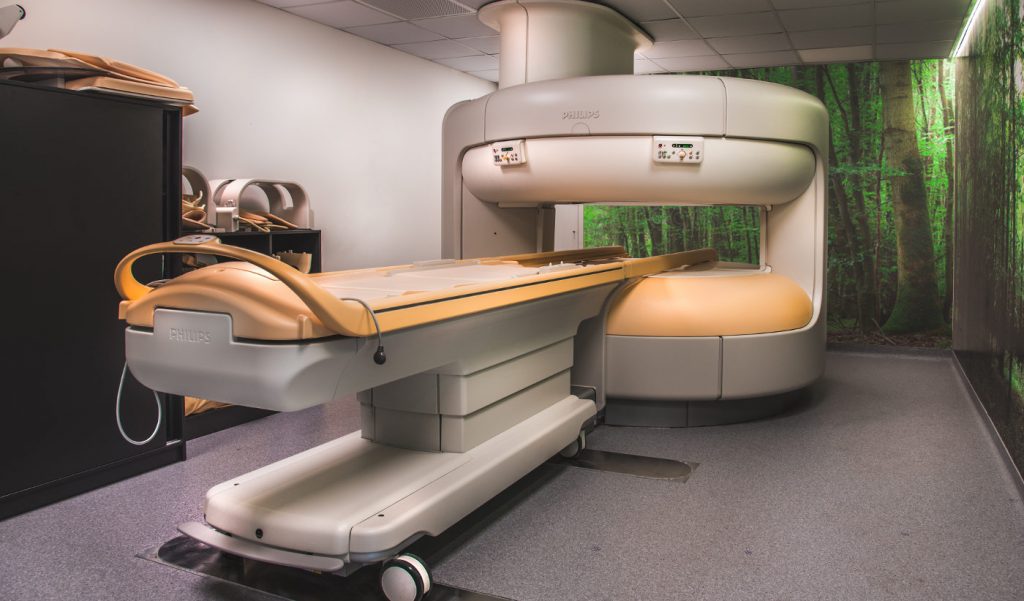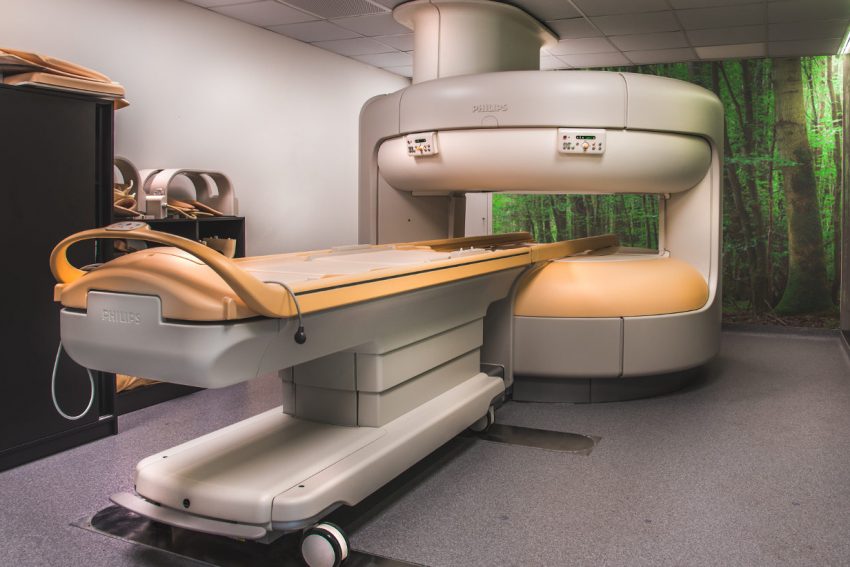Magnetic resonance imaging (MRI) has become one of the most important and flexible forms of medical imaging. It is based on the phenomenon of magnetic resonance and its most important advantage compared to the other imaging methods is that the patient is not exposed to ionizing radiation, but to magnetic and electromagnetic fields. The MRI is a safe and reliable imaging technique that mainly focuses on examining the central nervous system, joints, breasts, heart and any other body part that contains soft tissue.
The first open MRI scanner in Rethymno

Bioscan was the first imaging lab in Rethymno to install a state-of-the-art Phillips open MRI scanner, aiming to ensure high-resolution imaging scans, but also assist patients who were facing problems with closed MRI systems.
Open MRI Scanner
The MRI is a valuable diagnostic exam of modern medicine. However, the majority of MRI scanners are closed, meaning that the patient is forced to enter an enclosed chamber, after first lying on a special bed. This exam is not well tolerated by all.
Its benefits:
- No feelings of claustrophobia
- Option of having a carer in the room
- Weight and body type are no longer limiting factors for obese patients
- Easier and more convenient scan for children
The MRI has become easier and more convenient than ever at Bioscan. You will first be asked to remove all metal objects or electronic devices you may have on you, as they may affect the results of the scan. You will then be asked to lie on a bed, which, however, will not slide into a confined room. The MRI scanner at Bioscan ensures high-resolution results, while offering maximum comfort and the feeling of freedom to patients, due to its open structure and special design. During the exam, you will hear the scanning sounds, but you will not feel restricted at all, as is the case with closed MRI scanners. The exam is painless and may last from 30 to 60 minutes. After the end of the exam, you may return to your normal activities.
MRI Department Scans
The MRI Department performs all the exams on all the anatomical parts of the body:
- Brain MRI
- Pituitary gland MRI
- Eye orbit MRI
- Petrous bone MRI
- Head MRI
- Neck MRI
- Chest MRI
- Upper and lower abdominal MRI
- Spine MRI
- Joint MRI
- Bone MRI
- Soft tissue MRI
- Vascular MRI
- Breast MRI
Special MRI Scans
- Magnetic resonance angiography: Brain & body.
- Magnetic resonance cholangio-pancreatography: Imaging of the bile ducts and pancreatic duct.
- MR urography: A complementary exam for further investigation and description of lesions identified during intravenous urography, ultrasound or CT scan.
- Rectal MRI: Mapping of the initial local staging of rectal cancer.
- MR spectroscopy of the brain: Investigation of the metabolic activity of the brain for detection of pathologic foci.
- MR tractography: Technique used for the imaging of the nerve fiber interconnections in the brain and spine.
- Breast MRI: Complementary to digital mammography for women with genetic risk or previous family history of breast cancer.
- Multiparametric prostate gland MRI: Investigation of neoplastic lesions, treatment planning and relapse control. It is recommended to patients with high PSA levels and a negative prostate biopsy.
- MR arthrography:Investigation of the soft tissue surrounding the joint. It is most often performed on the hip and shoulder.
- Perfusion and diffusion MRI: Charting of the aggressiveness of tumors. Investigation of viable brain tissue following acute stroke.
- Iron deposition quantification MRI: Evaluates the deposition of iron in organs (liver, myocardium).
How is an MRI performed at Bioscan
The MRI has become easier and more convenient than ever at Bioscan. You will first be asked to remove all metal objects or electronic devices you may have on you, as they may affect the results of the scan. You will then be asked to lie on a bed, which, however, will not slide into a confined room. The MRI scanner at Bioscan ensures high-resolution results, while offering maximum comfort and the feeling of freedom to patients, due to its open structure and special design. During the exam, you will hear the scanning sounds, but you will not feel restricted at all, as is the case with closed MRI scanners. The exam is painless and may last from 30 to 60 minutes. After the end of the exam, you may return to your normal activities.


